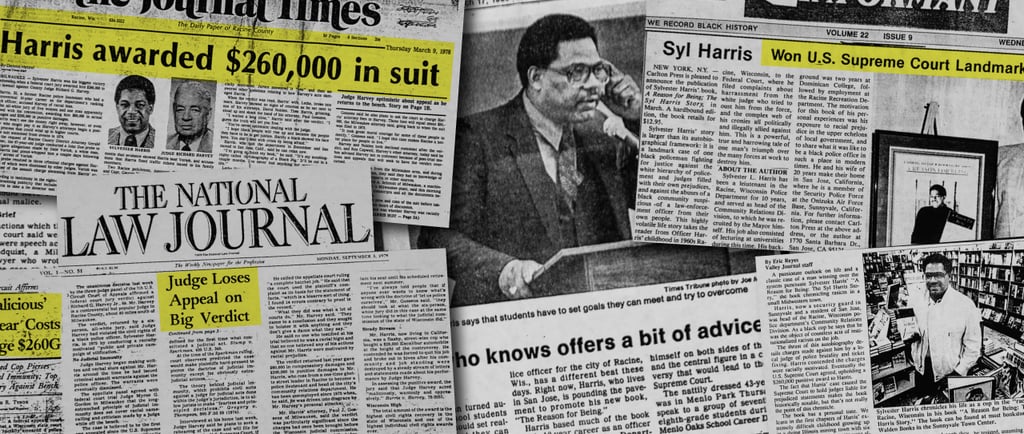Harris v. Harvey (1979)
Harris v. Harvey is the first case in United States history, where a sitting court judge was sued and lost in a civil action. The impact of reading my cousin Sylvester's memoir, A Reason for Being: The Syl Harris Story, reverberates in my soul today.
I stand on the shoulders of giants. One notable giant is my cousin Sylvester (Syl) Harris.
I knew growing up that Syl won a civil rights related lawsuit in the 70s, but I didn't understand the magnitude of his fight or victory until many years later. In my 20s, I read his personal memoir, A Reason For Being: The Syl Harris Story, and the impact of reading his story reverberates in my soul today.
The Story
In short, my cousin was recruited by the mayor to smooth race relations in the city of Racine, Wisconsin (my hometown) as part of the Community Relations Division in the Racine Police Department. Sylvester excelled in his role, earning promotions to sergeant and lieutenant, making him the first Black police lieutenant in Racine.
This title put a target on his back. Sylvester's own police union took issue with his promotion and solicited the support of Judge Richard Harvey, Jr., a sitting court judge, to get him fired. Judge Harvey orchestrated a racist campaign with falsified charges to smear Syl's name. Harvey's harassment led Syl to file a lawsuit against the judge. The evidence against Judge Harvey was so overwhelming that an all-white jury sided with Harris and awarded him a judgement of $260,000.
"Sylvester sued Judge Harvey and the case culminated all the way to the United States Supreme Court: Harris vs. Harvey, 605 Federal 2nd 330, became a landmark case. The case is also displayed in the International Civil Rights Museum in Greensboro, N.C., next to Dr. Martin Luther King’s display. It was the first time in US history that a judge was successfully sued for a civil rights violation." —San Francisco Bay View
Syl's victory was bittersweet. Yes, he won the case, but the whole ordeal led him to relocate from Racine to San Jose, CA. While Judge Harvey lost his case, he was never held accountable for his actions, his prior cases weren't reviewed after his racist conduct, and he was allowed to remain on the bench. In 2000, the Racine Journal Times even celebrated Harvey's legacy with the title "tough but fair judge" after his passing. An undeserved recognition given the judge's loss when his impartiality was on trail in Harris v. Harvey.
The Impact
Syl passed away on March 12, 2021—less than two months before my father (Syl's first cousin) also passed away. Although luckier than many, I believe their deaths were premature. We lost two great pillars of our family, but I am beyond grateful for the lessons they taught me. Syl's life was an example of standing up for justice and truth; I have no doubt that Syl's example influenced the strong moral compass that my father instilled in me.
A man dies when he refuses to stand up for that which is right. A man dies when he refuses to stand up for justice. A man dies when he refuses to take a stand for that which is true. —Martin Luther King, Jr.
Today on Martin Luther King Jr. Day, I opened the draft of this article to move it closer to the finish line. A quick Google search, although I've done many before, led me to something new—a San Francisco Bay View article with a photo detailing how newspapers across the country followed Syl's trial.
One of the papers to report on the Wisconsin case was our own Arizona Informant. A paper where, now over four decades later, I've published four of my own articles, including a recent front page story. Before today, I'd never seen the Arizona Informant headline celebrating the Sylvester Harris landmark U.S. Supreme Court win.
Life has a way of coming full circle. I carry my cousin's legacy with me for there is no equity without stringent accountability. We must overlook what is easy for the sake of doing what is hard and what is right.


